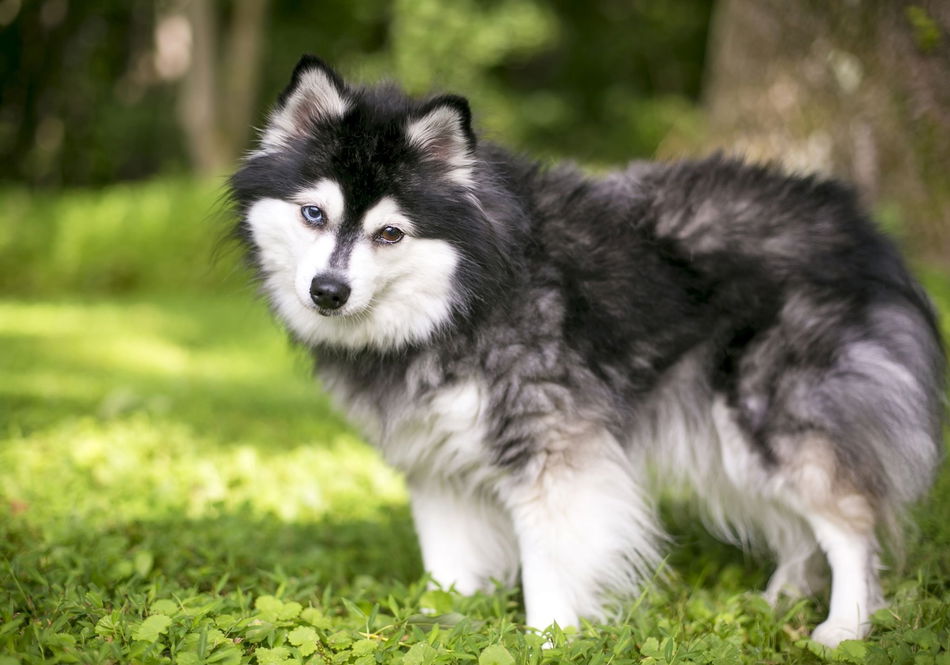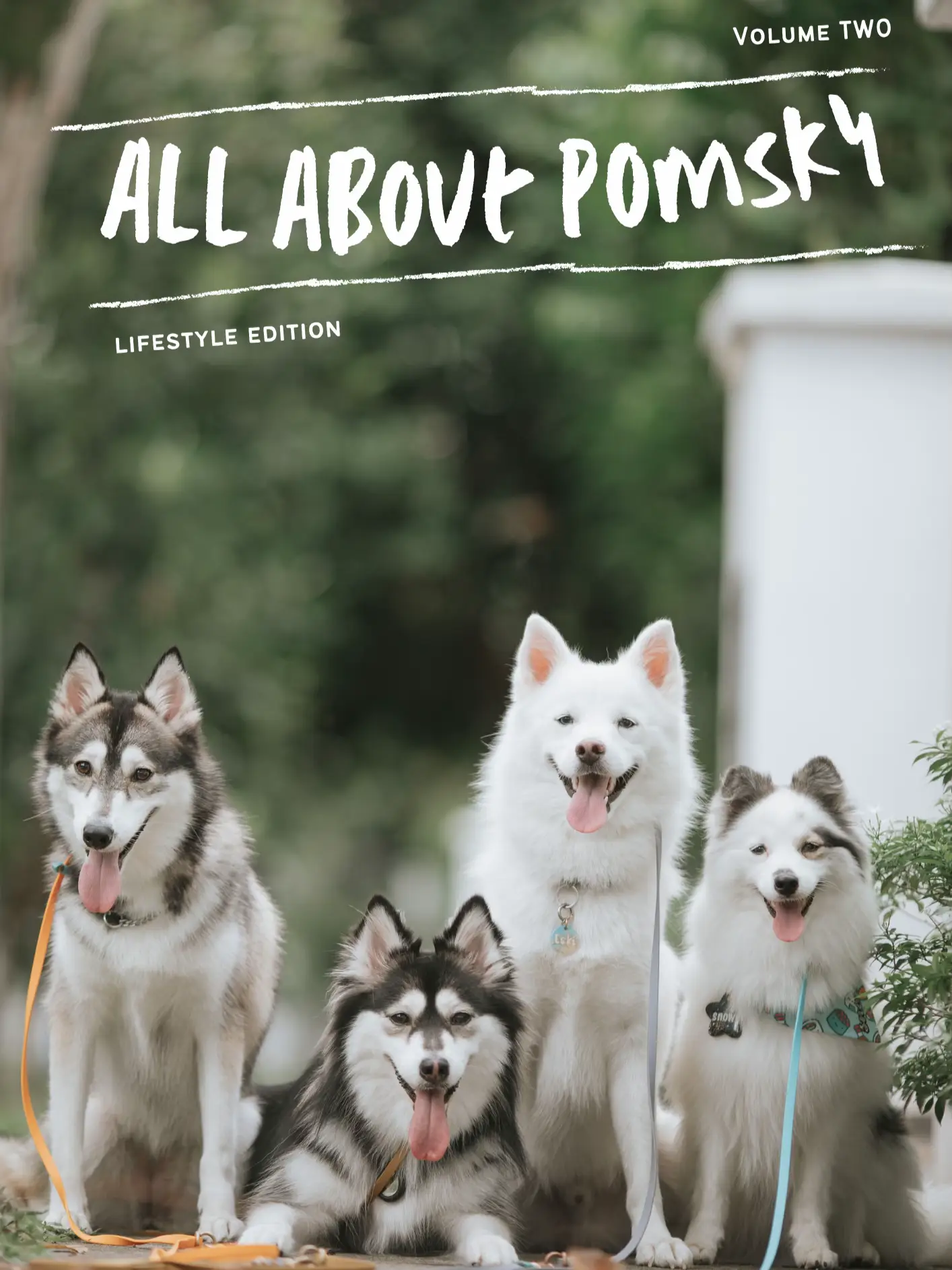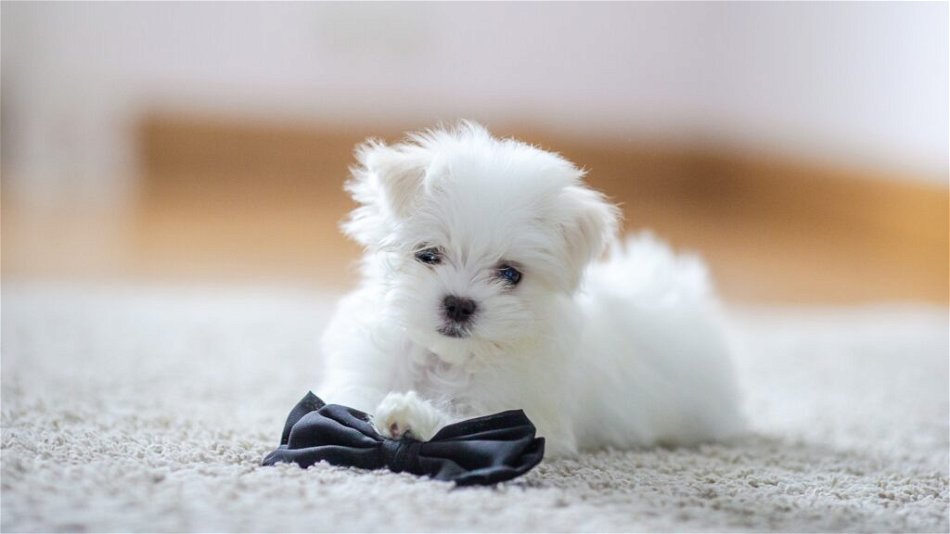Pomskies are not inherently aggressive, but their temperament can vary. Proper socialization is essential to prevent any aggressive tendencies.
As a designer breed, Pomskies combine the playful and energetic nature of the Siberian Husky with the boldness and alertness of the Pomeranian. This fusion results in dogs that are known for their intelligence, affection, and lively disposition. Generally, Pomskies are social animals that exhibit a welcoming attitude toward their family and can be suitable for various types of households, provided they receive adequate attention and training.
Despite their small to medium size, their personalities are quite large, and they are often seen brimming with confidence. However, like any breed, without the right upbringing and training, Pomskies’ energy and intelligence could lead to challenging behaviors, including potential aggressiveness. Therefore, consistent training and early socialization are vital in shaping a well-mannered and friendly companion out of a Pomsky. Owners should understand the demands and responsibilities associated with this breed to ensure their Pomsky grows up to be a good-natured family member.
Introduction To The Pomsky Breed
Imagine the striking eyes of a Husky paired with the fluffy charm of a Pomeranian. The result is a Pomsky, a breed that’s stealing hearts worldwide. Pomskies radiate a blend of their parents’ features, becoming a bundle of joy for dog lovers. Before delving into the temperament traits like aggression, let’s start at the beginning with the origins and characteristics of Pomskies and understand their soaring popularity and demand.
Origins And Characteristics
The Pomsky is a crossbreed between the Pomeranian and the Siberian Husky. This mix results in a range of size and appearance, but typically, Pomskies are small to medium dogs with an aura of majesty. Their fluffy coats, piercing eyes, and sociable nature often come from their Husky lineage, while their size and sometimes stubborn streak derive from the Pomeranian side.
| Characteristic | Description |
|---|---|
| Size | Small to medium |
| Coat | Thick and fluffy |
| Eyes | Often blue or heterochromatic |
| Personality | Playful and affectionate |
Popularity And Demand
Pomskies are a novel breed, skyrocketing to fame in recent years. Their stunning looks and friendly disposition make them sought-after companions. Social media buzz and the pet’s family-friendly attitude have also fueled their demand. Prospective pet parents should note that responsible breeding practices are crucial for the health and welfare of these dogs.
- Quickly rising in popularity
- Perfect for family environments
- Require ethical breeding practices
Addressing The Aggression Myth
The idea that Pomskies are aggressive by nature has been floating around for some time. Popular beliefs can often paint an inaccurate picture of certain dog breeds. In this section, we’ll take a closer look at Pomsky behavior. Pomskies are a mix between Pomeranians and Huskies, two breeds with very different temperaments. Their behavior is often misunderstood due to such contrasting backgrounds.
Prevalent Misconceptions
- Myth: Pomskies are naturally aggressive.
- Myth: Small dogs like Pomskies tend to be more hostile.
- Myth: Mixing Huskies and Pomeranians results in an unpredictable and wild temperament.
Reality Vs. Rumors
The truth about Pomskies is quite different from common misconceptions. Most Pomskies inherit the friendly nature of Huskies and the spirited personality of Pomeranians. Both parent breeds possess high energy levels and intelligence, often mistaken for aggression. Socialization and proper training can make a world of difference in shaping their behavior.
Below, key factors that influence Pomsky temperament are highlighted:
| Factor | Influence on Behavior |
|---|---|
| Training | Consistent, positive reinforcement training helps Pomskies learn proper behavior. |
| Socialization | Early exposure to different people and pets can promote friendly behavior. |
| Exercise | Regular exercise keeps their energy directed towards positive outlets. |
| Attention | They require attention and engagement to stay mentally stimulated. |
In reality, Pomskies are as capable of showing affection and docile behavior as any other breed. The key to nurturing a well-behaved dog lies in understanding their needs and guidance. Many Pomsky owners report having loving companions that thrive in family environments.
Temperamental Traits Of Pomskies
When welcoming a Pomsky into your home, it’s essential to understand their unique personality mix. These pint-sized powerhouses bring together the vigor of Huskies with the spunkiness of Pomeranians. A blend that creates an engaging, yet complex canine temperament.
Inherent Behavior Patterns
Pomskies inherit a rich tapestry of behaviors from their parent breeds. Known for their energetic and playful nature, they exhibit a zest for life that’s as infectious as it is relentless. Here are some of their key behaviors:
- Intelligence: Quick to learn and eager to please.
- Curiosity: Always on the lookout for adventure.
- Watchfulness: Natural guard dogs, alert and attentive.
Influence Of Husky And Pomeranian Genes
The genetic lottery of Pomskies means each pup may lean more towards Husky or Pomeranian traits. This chart helps you see the possible influence:
| Husky Traits | Pomeranian Traits |
|---|---|
| High Energy | Bold Personality |
| Independent Streak | Vocal Tendencies |
| Social and Friendly | Protective Nature |
To understand a Pomsky’s behavior, look at their daily actions. They may chase, due to the Husky prey drive, or yap with zeal, a Pomeranian’s way to communicate. Early socialization and training are key to managing these mixed traits.
Factors Influencing Pomsky Behavior
Understanding the behavior of Pomskies starts with recognizing the factors that shape them. These adorable furballs, a crossbreed of Pomeranian and Husky, can exhibit a wide range of temperaments. It’s crucial to know what contributes to their behavior.
Role Of Environment And Upbringing
Pomskies are products of their surroundings. A positive environment leads to a happier, more balanced dog. This includes a loving home, ample space for play, and proper nutrition. A stressful setting can spark aggression in Pomskies.
- Home atmosphere: Calm and peaceful homes cultivate gentle Pomskies.
- Exercise: Regular play and exercise can reduce anxiety and aggression.
- Nutrition: A balanced diet supports overall well-being.
Importance Of Training And Socialization
Training and socialization cannot be overstated for Pomskies. Early exposure to different people and animals teaches them to be friendly. Consistent training helps them understand acceptable behaviors.
- Puppy classes: A great start to socializing and learning basic commands.
- Consistency: Regular training leads to better-behaved Pomskies.
- Rewards: Positive reinforcement is key in encouraging good behavior.
Understanding Aggression In Dogs
When we talk about Pomskies, or any dog breed, knowing about aggression is vital. Aggression in dogs is a behavior with many causes. It can be due to fear, territorial defense, or even genetics. Understanding this behavior helps keep both pets and owners safe.
Defining Canine Aggression
Canine aggression seems scary. It is a dog’s way to say no to certain things. Aggression can mean barking, growling, or biting. Dogs show this behavior when they feel uneasy or threatened. Knowing what aggression is helps us to deal with it better.
Recognizing Signs Of Aggression
It is key to see the signs before a dog gets too aggressive. These signs can be:
- Growling when approached
- Snarling or showing teeth
- Stiff body and raised fur
- Staring intensely at something or someone
- Snapping or lunging forward

Credit: pawsafe.com
Managing And Preventing Aggression
Dog lovers adore Pomskies for their fluffy coats and playful nature. These dogs are a mix of Siberian Huskies and Pomeranians. Yet some owners ask, “Are Pomskies aggressive?” The answer lies in their upbringing and environment. Preventing and managing aggression in Pomskies is a vital part of their care. It ensures they remain loving and social pets. With proper techniques, you can guide your Pomsky to behave well.
Effective Training Techniques
Training a Pomsky requires patience and consistency. Start training early when your Pomsky is a puppy. Use positive reinforcement for the best results. Always reward good behavior with treats or praises. This makes learning enjoyable for your Pomsky. Establish yourself as the leader to help your Pomsky feel secure.
- Socialize your Pomsky early: Introduce them to different people, animals, and situations.
- Set clear boundaries: Teach your Pomsky what is acceptable behavior.
- Be consistent with commands: Use the same words and actions when you train.
- Keep training sessions short and fun: Training should be enjoyable, not stressful.
Professional Help And Intervention
Sometimes, despite your best efforts, your Pomsky might show signs of aggression. Professional help can make a difference. A certified dog trainer or behaviorist understands dog psychology. They can address aggression effectively. Look for professionals with experience in Pomskies or similar breeds.
- Seek a professional dog trainer: Choose someone who uses positive reinforcement techniques.
- Consider a behavioral consultation: A dog behaviorist can identify the root causes of aggression.
- Enroll in a training class: Group classes allow your Pomsky to socialize and learn in a controlled environment.
Remember, each Pomsky is unique. Tailoring management and prevention strategies to your pet’s needs is crucial. Positive experiences from a young age set the stage for a well-adjusted Pomsky. Your efforts will help nurture a loving, happy companion.
Real Owners, Real Experiences
Understanding a Pomsky’s behavior takes more than reading articles. It requires listening to those who live with them day-to-day. These hybrids come from Siberian Huskies and Pomeranians. Their nature can be best known through authentic stories from Pomsky owners. Here’s a glimpse into the real world of Pomsky temperament.
Testimonials From Pomsky Owners
Owners all over have shared insights into their Pomsky companions. Their testimonials reveal that whilst some Pomskies show strong, confident traits, others exhibit a calm, loving demeanor. These first-hand accounts bring to light the diverse personalities within this breed. With proper training and socialization, aggression seems to be the exception, not the rule. Here’s what Pomsky parents say:
- Jenny’s Experience: “Milo is more playful than aggressive. With kids, he’s gentle and hasn’t shown any worrying signs.”
- Mark’s Chronicle: “Luna sometimes tries to assert dominance, but training has curbed any aggressive tendencies.”
- Sarah’s Tale: “Echo had behavioral issues at first, but patience and positive reinforcement changed that.”Success is achievable.
Case Studies And Success Stories
Experts and vets often chime in with their own findings. By delving into detailed case studies, they have observed Pomsky behavior in various settings. Some of the most notable success stories highlight that with love, firm training, and consistency, Pomskies thrive and show minimal signs of aggression. Professionals recommend early socialization for shaping their personality positively. Here are a couple of such cases:
| Owner | Challenges | Success Techniques | Outcome |
|---|---|---|---|
| Emily | Resource Guarding | Desensitization Training | Mitigated Aggressive Responses |
| David | Leash Reactivity | Behavioral Adjustment Training | Improved Public Behavior |
These studies show patience and the right techniques make the difference. A Pomsky’s aggressiveness can be managed and oftentimes completely resolved.
Making The Right Choice
Making the right choice when bringing a dog into your home is crucial. It’s about fitting your lifestyle with the canine’s traits. Pomskies, a mix between the energetic Husky and the protective Pomeranian, may raise questions about temperament. By understanding their possible behavior patterns, you stand a better chance at a harmonious relationship. Let’s delve into whether a Pomsky makes a suitable companion for you.
Assessing If A Pomsky Is Right For You
Considering a Pomsky’s needs sets the stage for a positive bond. These are dynamic dogs that display a range of behaviors. They inherit traits from both parent breeds. Know these facts to make an informed decision:
- Energy levels: They are high, requiring daily rich playtime.
- Social needs: Pomskies thrive on attention and interaction.
- Training: Start early to prevent stubborn or unwanted behaviors.
- Size: They typically weigh between 20 to 30 pounds, an ideal size for many homes.
- Climate adaptability: Their thick coat means they manage well in cooler conditions.
Responsibilities Of Pomsky Ownership
Owning a Pomsky involves more than just enjoying their company. It’s a commitment to nurturing and guiding them. Prepare to tackle the responsibilities that include:
| Duty | Details |
|---|---|
| Exercise | Daily walks plus playtime keep them fit and happy. |
| Grooming | Regular brushing reduces shedding and maintains coat health. |
| Training | Ongoing, with positive reinforcement being key. |
| Healthcare | Routine vet visits and vaccinations are non-negotiable. |
| Nutrition | High-quality diet tailored to their size and activity level. |
Selecting a Pomsky means embracing both fun and duty. They show intense loyalty and affection. Manage potential aggression with thorough training and socialization. Remember, not all dogs of this breed display aggression. Many factors, including upbringing, play major roles in shaping their behavior. Making the right choice matters, and it starts with honest assessment and understanding.
Conclusion: The Verdict On Pomsky Temperament
Understanding a Pomsky’s temperament helps clarify what to expect as a pet owner. These dogs blend the traits of Huskies and Pomeranians. Let’s wrap up what we’ve learned about Pomsky personalities and consider key points for future owners.
Summarizing Pomsky Personalities
Pomskies inherit diverse traits from their parents, often making their temperament unpredictable. Yet, we can trace common characteristics that many Pomskies share.
- Playful and Energetic: They love playtime and require regular exercise.
- Intelligent: Pomskies are smart and thrive with mental stimulation.
- Friendly: They generally enjoy making new friends, both humans and pets.
- Loyal: A Pomsky often forms strong bonds with their families.
- Stubborn Streak: Some may show a stubborn side, especially if not trained early.
Final Thoughts For Prospective Owners
Before deciding, it’s crucial to weigh the traits of a Pomsky against your lifestyle. They require time, training, and patience.
| Consideration | Action Required |
| Exercise Needs | Daily walks and playtime |
| Training | Consistency from an early age |
| Socialization | Regular interaction with various people and pets |
| Attention | Quality time spent every day |
Understanding these points ensures a loving and harmonious relationship with a Pomsky. Naturally sociable and affectionate, Pomskies shine in the right environment. They rarely show aggression when their needs are met. With proper care and training, they make wonderful companions.

Credit: www.lemon8-app.com

Credit: petsgators.com
Frequently Asked Questions On Are Pomsky Aggressive
Are Pomskies Good Family Dogs?
Pomskies are great family dogs, known for their friendly nature and intelligence. They thrive on companionship and fit well into family life with proper training and socialization. Their playful demeanor often makes them favorites among children.
What Is A Pomsky Temperament?
A Pomsky typically has a playful, affectionate temperament, combining the Siberian Husky’s energy with the Pomeranian’s sociability. They’re intelligent and may exhibit stubbornness, but with consistent training, they become good companions.
Do Pomskies Get Along With Other Dogs?
Pomskies generally enjoy the company of other dogs. Early socialization ensures they develop good relationships with their canine companions.
Are Pomskies Destructive?
Pomskies can become destructive if bored or not properly exercised. Consistent training and mental stimulation help prevent this behavior. Regular playtime and attention are essential.
Conclusion
To wrap up, Pomskies exhibit a blend of traits from Huskies and Pomeranians. Their temperament is generally friendly, but like any breed, socialization is key. Early training deters potential aggression, ensuring these lovable pups maintain their reputation for being good companions.
Always remember, a well-cared-for Pomsky is a happy, non-aggressive family member.

